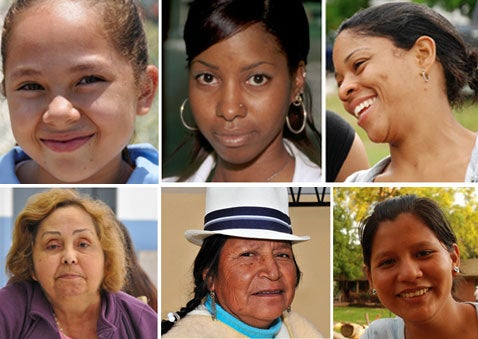

In celebration of International Women's Day, on 8 March, the Pan American Health Organization/World Health Organization (PAHO/WHO) is calling on countries to guarantee all women access to essential health services and interventions. This year's slogan for International Women's Day is "Equality for women is progress for all."
Access to essential health services and critical interventions can save women's lives and improve their families' health and well-being
Washington, D.C., 7 March 2014 (PAHO/WHO) — In celebration of International Women's Day, on 8 March, the Pan American Health Organization/World Health Organization (PAHO/WHO) is calling on countries to guarantee all women access to essential health services and interventions.
 This year's slogan for
International Women's Day is "Equality for women is progress for
all." Studies show that empowering women and improving their health
benefits not only women but also their families. For example, children whose
mothers die in childbirth have a higher risk of dying before age 1 than
children whose mothers survive childbirth.
This year's slogan for
International Women's Day is "Equality for women is progress for
all." Studies show that empowering women and improving their health
benefits not only women but also their families. For example, children whose
mothers die in childbirth have a higher risk of dying before age 1 than
children whose mothers survive childbirth.
In addition, research shows that women with more education tend to have better health and healthier families, which contributes directly to healthier communities. Other studies have shown that women are often the primary decision-makers about their families' health.
"Educating, protecting and empowering women is essential for their own well-being as well as that of their families and communities," said Dr. Carissa Etienne, PAHO/WHO Director. "Access to health care through universal health coverage is a key part of protecting and empowering women, ensuring their right to health, and enabling them to contribute fully to their countries' development."
 "Moving forward in
the post-2015 development agenda, we need to urge renewed attention to gender
equality and equity as principles for both women's health and universal health
coverage," said Dr. Gina Tambini, Director
of PAHO/WHO's Family, Gender and Life Course Department.
"Moving forward in
the post-2015 development agenda, we need to urge renewed attention to gender
equality and equity as principles for both women's health and universal health
coverage," said Dr. Gina Tambini, Director
of PAHO/WHO's Family, Gender and Life Course Department.
PAHO is working with the countries of the Americas to achieve universal health coverage; to address women's health needs comprehensively; and to ensure that health systems acknowledge and appropriately respond to gender inequality issues.
Facts about women's health in the Americas:
- The total fertility rate (children per woman) in LAC has declined from 5.02 in 1970 to 2.2 in 2013 (UN Population Division).
- On average, 17 women die in childbirth from causes that could be prevented with better organized and more accessible health systems. Adolescents and indigenous women account for a disproportionate number of these deaths (PAHO Basic Indicators 2013).
- More than 50% of pregnancies are unplanned (Guttmacher Institute, 2011).
- Unmet family planning needs are higher among poor women, adolescents and uneducated women than national averages, which vary from 7% to 37% (ICF International).
- Region-wide, 94.6% of women have access to health care by trained personnel, at birth, however rates vary from 38% to 100% across countries (PAHO Basic Indicators 2013).
- Women's out-of-pocket spending for health is 16-40% higher than men's (Health in the Americas 2012, PAHO).
- One in three women has reported physical/sexual violence by an intimate partner or former partner (CDC/PAHO Multi-country Study 2012).
- In Latin America and the Caribbean, depression is among the top causes of illness for women (Gomez-Gomez 2013).



